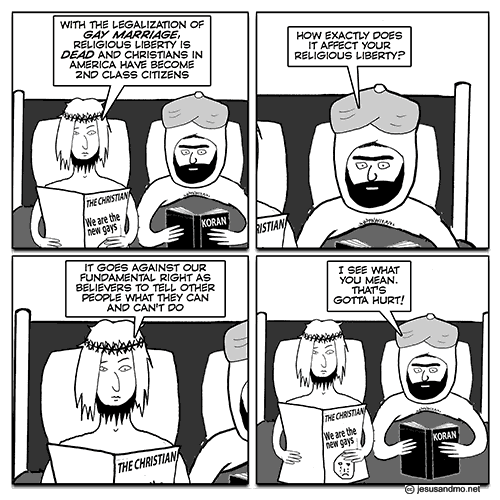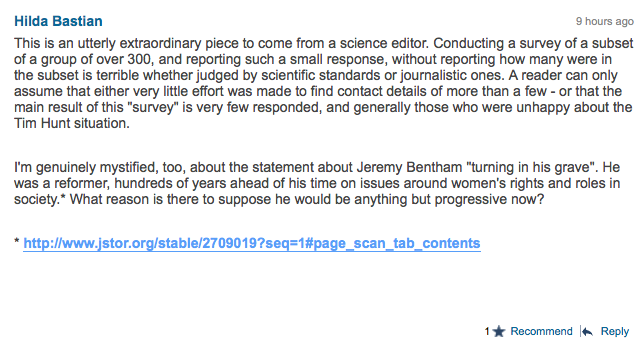Damn, yet another one. Howard Jacobson has a nasty, inaccurate, reactionary column in the Independent about Tim Hunt. Defend to the death the right of important men to talk sexist shit to groups of women scientists at conferences!! The world will fall out of orbit if you don’t!!!
Tim Hunt has the air of a man who doesn’t put his appearance first, a man who, whether calculatedly or otherwise, inhabits that sphere of extraterrestrial idiosyncrasy whose uniform is a cream linen jacket bought from one of those shops in Piccadilly where they come pre-battered, a fisherman’s smock (probably picked up in Cornwall), stained owlish spectacles, a cord that goes around the neck to hang them from (else they’d fall into a laboratory bath) and, yes, figurative tufts of nostril hair.
Among the reasons universities exist is that such men should have a habitat. They are a dying species. When I went to university, there was almost no other way for a don to look. A few military men and dandies were the exception, but even their moustaches and cravats were mildewed and wouldn’t have passed muster anywhere but in the Fens. Otherwise, the Scarecrow look from The Wizard of Oz prevailed. Bicycle clips, one trouser leg still in the sock, ties unevenly knotted, hair growing out of their ears and from their noses, sometimes in odd fringes above their shirt collars, occasionally in tussocks on their cheeks.
And on and on he goes. It’s all about men, you see – men as endearing disheveled nerds at universities, men with bicycle clips and sloppy ties, men men men. That’s their world; women are intruders. Women are this weird off eccentric little species that you hardly ever see, and they have no place at universities or much of anywhere else except kitchens and beds. Therefore, Tim Hunt wuz lynched.
His next step is to say they all have terrible opinions, of course they do, what do you expect.
There have to be places where people let nostril hair run wild, think differently from the rest of us, implicitly call into question and even deride everything we have made up our minds about, find wisdom through unconventionality, and say a lot of foolish things along the way. Universities are such places. Correction: universities should be such places.
Show me a university which is a hotbed of thin-skinned offence-taking, where every unacceptable idea is policed and every person who happens to hold one is hounded out of a job, and I will show you a university that isn’t a university but an ideological prison camp and indoctrination centre.
And there it is – that big lie, yet again. Tim Hunt was not hounded out of a job.
Reaffirming the college’s pusillanimous decision to show Tim Hunt the door, the Provost of University College London said: “Our commitment to gender equality and our support for women in science was and is the ultimate concern.” Wrong, Mr Provost. The right of women to enjoy equal opportunities, receive equal pay and enjoy equal respect to men in science, or anywhere else come to that, is without doubt a matter of high importance. But it is not as high, if we are to talk of “ultimate concerns”, as the freedom to think freely and independently – a freedom which matters as much to women as to men, and without which equality must lose its savour.
Tim Hunt wasn’t shown the door. He wasn’t inside to be shown the door. There was no door to show him. He wasn’t fired, he wasn’t sacked, he wasn’t hounded out of a job, he wasn’t shown the door. His honorary professorship, which is not like a real one, was withdrawn. That’s all.
(This is a syndicated post. Read the original at FreeThoughtBlogs.)







